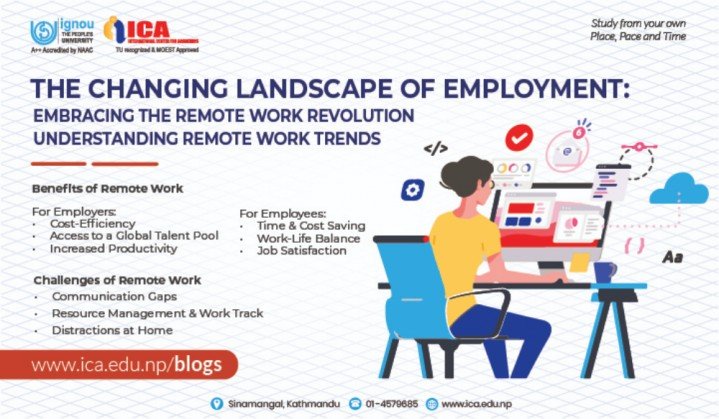
Changing Landscape of Employment: Embracing the Remote Work Revolution
The employment landscape around the world is rapidly evolving, and remote work has become a significant trend shaping the future of work. As companies continue to adapt to new technologies and changing workforce expectations, remote work is no longer just a perk but a necessity. For Bachelors and Masters students preparing to enter the workforce, understanding these trends is crucial to ensure they are well-positioned for the future. Delve into the current state of remote work, its benefits, challenges, and the skills required for successful implementation.
Understanding Remote Work Trends
As a result of the COVID-19 pandemic, the post-pandemic era has witnessed exponential growth in the practice of remote work rather than traditional office settings. Remote work culture is now prevalent in various industries, including technology, healthcare, business, finance, and more. According to a report by Global Workplace Analytics, the number of remote workers in the United States increased by more than double between 2013 and 2019. This trend is not limited to the U.S. In Nepal, remote work opportunities have also been on the rise, especially in the technology and business sectors.
Companies worldwide are recognizing the benefits of a remote workforce, leading to a significant shift in how we view traditional employment. For instance, a report by Healthcare IT News found that 92% of healthcare organizations have implemented telehealth programs, enabling remote consultations and care. Similarly, a survey by Gartner revealed that 74% of companies plan to permanently shift to more remote work post-pandemic. This widespread adoption underscores the versatility and applicability of remote work across different sectors.
Benefits of Remote Work
Remote work offers numerous benefits for both employers and employees, contributing to its rapid adoption. Following are some key reasons why so many organizations are switching to remote work practices.
For Employers:
Cost-Efficiency: Companies save on overhead costs, such as office space, utilities, and office supplies. This helps save the operational cost of the company by a great margin, helping them financially.
Access to a Global Talent Pool: With remote work, employers do not have to limit hiring their employees from a certain geographic location. They can hire the best talent for the job across a global talent pool.
Increased Productivity: Studies have shown that remote workers often have higher productivity levels due to reduced commute time, flexible working hours, increased autonomy, and customized work settings tailored to the employees’ needs.
For Employees:
Time & Cost Saving: The area where remote work is most beneficial for employees is the elimination of daily commutes and working hours, which saves the cost and time of employees going back and forth to the office every day.
Work-Life Balance: Remote work allows employees to balance their professional and personal lives more effectively, given the autonomy they have to manage their work schedule.
Job Satisfaction: A greater work-life balance allows employees to have higher performance and lower stress, which increases overall job satisfaction.
Challenges of Remote Work
While remote work offers numerous benefits, transitioning from a traditional work setting to remote work can be challenging. People and organizations might face the following difficulties which can prove to be challenging if not handled well.
Communication Gaps: Remote work requires effective communication and collaboration tools to stay in touch with each member of the team. Inadequate or inefficient use of these tools can hinder team dynamics and project outcomes.
Resource Management & Work Track: If the employee, resources, and work outcomes are not kept in check, it might directly impact the operational productivity. The organization must ensure that its employees have proper devices, electricity, internet, and online tools available at all times. Also, timely completion of work is vital to ensure work results do not get affected by a lack of resources and people management.
Distractions at Home: One of the major problems that remote work can present is having numerous distractions. Although remote work does provide flexible work schedules for employees, blurred lines between work and personal life can make it challenging for them to complete their work or even lead to burnout if not managed properly.
Social Isolation: Lack of face-to-face interactions can lead to feelings of loneliness and isolation. This can affect mental health and team cohesion.
Tips for Overcoming Remote Work Challenges
To thrive in a remote work environment, students who want to opt for remote work can follow the following tips to stay ahead of the curve.
Establish a Routine: Define specific work hours and stick to them to stay organized and productive. Generate a plan to efficiently manage your time to balance work and personal responsibilities. This involves setting goals, creating schedules, and adhering to deadlines without direct supervision.
Set Up a Dedicated Workspace: Designate a specific area in your home that is free from distractions. This helps in mentally separating work from personal life.
Take Breaks: Schedule regular breaks to avoid burnout and maintain a healthy work-life balance.
Communication: Use any communication platform such as Slack, Zoom, and Asana to stay connected with your team. Regular check-ins and team meetings via video conferencing can help maintain communication and foster a sense of connection among team members.
Build Tech Skills: Find efficient digital tools and platforms that will help you learn or ease your workload, and build proficient skills to finish work more efficiently.
The future of remote work looks promising. As technology continues to advance, more industries will embrace remote work models. Hybrid work environments, combining remote and in-office work, are expected to become the norm. This shift will require a workforce that is adaptable, tech-savvy, and capable of managing their time and responsibilities effectively. As students prepare to enter the workforce, it is essential for you to understand the benefits, challenges, and skills required for successful remote work implementation. By adhering to these trends, you can prepare yourselves for a successful career in the future work setting.
Prepare yourself for the future of work with the International Career Academy (ICA), a reputed distance-learning institution accredited by IGNOU, offering Bachelor's courses and Masters courses in Management, Humanities, Social Science, Tourism, and Computer Science. Our online classes and self-learning programs help you familiarize yourself with the remote working environment so that you can thrive when others just beginning their steps. Enroll today and take the first step towards a successful and fulfilling career in the digital age.
 01- 4579685/ 4583902/ 4578471/ 4591485
01- 4579685/ 4583902/ 4578471/ 4591485 support@ica.edu.np
support@ica.edu.np
 9818505224
9818505224


